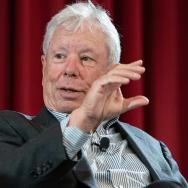What role does storytelling play in our personal and professional lives? That was the focus of the latest event in the University of Chicago's “Meeting of the Minds” series, co-hosted by the Booth School of Business and the Stevanovich Institute on the Formation of Knowledge.
Titled “The Impact of Effective Storytelling," the Nov. 16 conversation was led by Clinical Prof. Guy Rolnik of Chicago Booth, a former financial journalist, editor and policy entrepreneur; and Assoc. Prof. Vu Tran, a novelist and short story writer who is the author of Dragonfish.
Moderated by Allison Cuddy, director of the Chicago Humanities Festival, the conversation touched on everything from storytelling’s constant presence in our lives to how specific we should make our stories to the ethics of storytelling.
The constant presence of storytelling
Those who don’t consider themselves artists may feel far removed from storytelling, but we’re all a lot closer to it than we might think, the speakers argued.
“Every single day when you interact with people, you’re telling a story about yourself—the way you dress, how you talk, how you gesture,” said Tran, an associate professor of practice in the arts in the Department of English Language and Literature. We engage in storytelling even when we’re alone, he added, which helps us create goals.
“You tell yourself a story about how you should be feeling, and what you want the next day,” he explained. “The great benefit of telling yourself a story about yourself is that it tells you what you want. It gives you motivation. Life is so messy and confusing and uncertain, but stories distill incoherent information into a manageable narrative. You can create a coherent portrait of who you think you are.”
Rolnik agreed, saying that storytelling helps us make decisions and navigate a world that constantly bombards us with information. In his course Storytelling and Narratives in Business, he impresses on his students that everything in the world around them is people telling stories. Companies craft stories, and control—or lose control of—narratives.
“You use storytelling to get a job,” said Rolnik, who teaches strategic management at Chicago Booth. “You use storytelling to lead your team. Storytelling is critical when you want to introduce change to any organization.” We use stories, he said, with investors, and companies use them to influence politics and regulations.
He pointed to his own early experience as an entrepreneur, and how the ability to convince a lot of people—from his board of directors to his employees—of the sustainability of his business was essential to its survival. “This is what I tell students: at some point in your life, the only thing that is going to save you in your business career is storytelling.”
“If you’re not a good storyteller, people don’t listen to you,” Tran added. Whether their narratives are destructive or rich, good storytellers are the ones whom people will pay attention to.
Specificity versus the universal
There’s a mythos that you have to get as broad as possible to appeal to as many people as possible, but the opposite is truer to the reality, Tran argued. The more specific you get, the more zoomed-in the story, the more people are able to see their own struggles reflected in the story you’re trying to tell.
“What I would say to my students or to any person writing fiction is that you should not try to appeal to the universal,” he said. “The more specific you are about your characters and the world of your fiction, and the more convincing you make the specific, that is what will appeal to more people.”
Rolnik added the caveat that tapping into universal values in a story can help you appeal to a wide variety of people, but the key in a business setting is knowing your audience and their values. Otherwise, you won’t be successful instilling in them your ideas. Whether you’re telling stories to shareholders, consumers, or regulators, you have to do your due diligence.
“You cannot just say, this is a story that fits everyone,” Rolnik said. “They came to the conversation with their own stories, and you should acknowledge that.”
To illicit a quick response from your audience, Tran said creating a visceral effect is one of the most effective methods. “Violence [or conflict] creates a visceral effect,” he said, “but so does a portrait of love.”
“Even in the business world, the more emotional the story is, people will listen,” Rolnik added. “If you know your audience and find the right value that is center to the story, people will pay attention, and you will be able to transport your audience to your own world.”
The ethics of storytelling
If storytelling can be used to persuade people of your ideas, where’s the line between storytelling and manipulation?
“If you’re trying to fight against reality and reshape it for your end goals, that’s one thing,” Tran said. “But if you are open to it, and you’re willing to capture it the way it is, and what you’re shaping is really just about making it more coherent and alive for the audience, I think that’s the fine line: fighting against reality or being open to it.”
He added that bias and manipulation are not inherently bad. “I think that’s perfectly human. You have to have bias,” said Tran. “You have to be discerning.” The difference is whether your bias comes from an informed and unprejudiced source or way of thinking.
Rolnik emphasized that what matters is the intention behind the manipulation. “In the business world, I’d say that the best storyteller first of all understands the power of stories,” said Rolnik. “And understands that stories can be very dangerous also.”
If you look at stories trying to manipulate us for good or for bad—such as to convince us of the teller’s stance on major political issues like climate change or big tech—they use the same techniques and structure. So what’s the difference?
“The basic element of a good story will not change, even if we stream the story or it’s on TikTok,” said Rolnik. “We still tell our children today ‘Cinderella,’ a story written almost 400 years ago, and it works.”
The biggest challenge we’re facing today is not stories themselves, but whether technology will decide the kind of stories that we are exposed to, he said. With so many stories in the world, these decisions have a lot of potential for manipulation. Particularly in the age of Facebook and the way algorithms can privilege certain stories over others, it is vital to understand where information is coming from.
“If you want to be ethical about storytelling, you should make sure that the audience knows where you’re coming from, and why you’re telling the story,” he said.
While everyone’s ethics are different, Tran emphasized that there’s a specific way to approach storytelling in an ethical manner. The main thing is to “be open to the world,” which he attempts to translate into his stories. “At the end of the day,” Tran said, “am I trying to understand myself better when I tell a story, and am I trying to understand other people better when I’m telling a story? That’s the only goal for me.”
—A version of this story was first published by the Booth School of Business.

